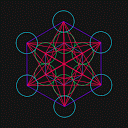My prunus tree is in blossom. On the bare branches that seemed so lifeless a few short weeks ago, the woody arms of the tree are now hidden by an explosion of delicate, pale pink flowers. Their fragile beauty moves me deeply. The fact that they are so short-lived intensifies their beauty. In the morning they may be gone as we expect much rain over the next few days.
I was able to savor their beauty and watched the bees darting from one deep-throated blossom to the next. It struck me how insignificant human beings are, how unconcerned with with us and our lives are the bees, as they go about their activities, in silence. It reminded me of Yellowstone a couple of winters ago when I had the privilege of being there with my husband — a winter wonderland indeed. A blizzard the previous day left the earth covered with feet of pristine and sparkling snow. We walk over to Old Faithful to watch the eruption, and miraculously found ourselves totally alone with the geyser in all its magnificence— except for a herd of bison, white- faced from foraging beneath the snow. We were overwhelmed with
nature’s majesty, and the over-riding silence of the experience, that was
interrupted only by the occasional snort of a bison, and the bubbling of
the heated water beneath us. As a coyote silently padded through the
snow, seemingly oblivious of both the bison and of us, I was reminded of
the words of Rabbi Abraham Joshua Heschel:
“There are three aspects of nature which command our attention: power,
loveliness and grandeur. Nature’s power we exploit, its loveliness we
enjoy, and its grandeur fills us with awe. Those who are not affected by
the vision of earth and sky, who have no eyes to see its grandeur and
sense the sublime, however vaguely, are not human.”
